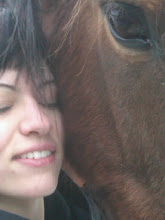This seems like a simple idea, to have respect for the horse, to love your friend! But when we really get into the matter, the real idea of the horses' voice, it becomes a bit more complicated and lot more difficult to understand and execute.
This is also where the idea that The Horse is Always Right comes into play.
Here is how I explain this concept:
My mare, Vita, has been handled in a traditional manner for 13 years, since birth. She came to me August 22, 2008. Since then, she is not scolded for the grouchy faces she makes, the threats with her hinds, or any behavior considered negative in the traditional world. She is not pressured in any way to act in a certain way.
She has a problem with her shoulder which also affects her diagonal stifle. Because of this, there are areas of her body that she does not like touched. There are certain ways she does not like to be touched, and certain days that she does not like to be touched, even certain seasons!
She indicates this in the language of Equus. She pins her ears, tosses her head, and stomps her feet and will usually walk away. If something REALLY bothers her, or I startle her with my touch, she will kick out, or snap her teeth.
During a chiropractic adjustment, I noticed Vita's severe agitation at being touched. At several points, she snapped her teeth down toward me while stood by her head. Never having had her bite me, I offered my arm. Sounds a bit crazy, I know. She never bit me. Every time, she would restrain herself. The restraint and frustration was so vivid in her expression. I have carried that with me for weeks after.
Not long ago, Vita was bitten by another horse, a playful gelding, but rather painfully, a clean slice. I checked it every day to make sure it was healing well. One day, I ran my hand along her shoulder below her withers, and suddenly she swung around and smacked my back with her open jaws! It was the first time she had made contact in a effort to bite! (thank heavens for winter and thick coats!) I jumped back and was startled, and she reacted by pulling back also, ready to be punished. I stroked her, and told her what a good girl she is, that I understand she is in pain, and does not want me to touch her in that place! Upon further investigation, she had a second bite, still swollen, that I had run my hand right over, firmly, without knowing. She was telling me, the only way she knew how, that she had been hurt.
Since this time, she has bitten me (again, thanks for nice thick winter jackets) only twice more, and each time with greater confidence. The last time, she snagged my sweatshirt, and when I did nothing, did not scold, did not react in any way other than to stop what I had been doing, I could feel her whole body sigh and say "thank you".
What is important to observe here, is that while I respect what Vita tells me, like when to stop, what hurts, etc, I also understand that her pain is chronic, and we have developed an understanding that sometimes things HAVE to be done....first aide must be administered, or that just want to understand the problem so I can address it in the best way I can. By keeping this in the forefront of my intent, I can let Vita have her voice, I can encourage her to use her voice loudly! She can give me her feedback, she can show me her language, and I understand it.
By letting the horse use his/her voice, we can offer our trustworthiness. By refraining from punishing the horse for expressing himself, we can show that we can be a friend. We can discover a new, different, and incredible relationship with the horse that is far more rewarding than our traditional means of controlling and insisting upon the horse.
